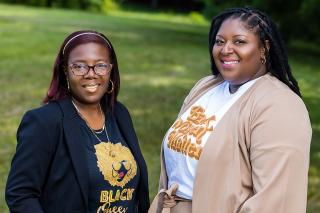Jerrica Raspberry Lawson '17MSW, '26PhD and Tiffany Cooper '16MSW are the co-founders and CEO's of Kujichagulia (Kuji) Wellness Center, a virtual practice based in Massachusetts that provides individual counseling, clinical supervision, and consulting. Their services are client-centered, culturally-affirming and trauma-informed. We spoke to them recently about what inspired them to create the Center.
Tiffany Cooper '16MSW knew that she wanted to create change. Initially planning to pursue the legal route of a social work career, she eventually realized that pursuing her Master's in Social Work was the best fit for her.
While getting a BS in Psychology at Northeastern, Jerrica Raspberry Lawson '17MSW, '26PhD had a co-op at a residential facility, where she admired the work of the clinicians for children. Then she found out that they all had a Master's in Social Work. "I remember leaving work that day and calling my mom to say, 'I'm going to get a Master's in Social Work.'" Raspberry Lawson recalls. "I just knew that it was the key that I was looking for."
After attaining her Master's, Raspberry Lawson wasn't quite done. "I have a passion for researching topics and changing the policies, being preventative in that way. So, I decided to get a PhD to pursue this passion," she says. "As far as coming back to Simmons for the PhD, I had the best experience in my MSW, so it felt like a no-brainer."
Along with providing her with clinical skills to be a social worker, Simmons gave Cooper a multi-faceted education, with some courses taught by professors in other disciplines. "I had a domestic violence class that was taught by a lawyer," recalls Cooper. "Having that intersection was great, because as a social worker, you're just thinking about it clinically, not realizing all the barriers that come in because of the legal system. I really got to see how social workers can work in tandem with other disciplines."
Raspberry Lawson appreciated how Simmons professors put leadership opportunities on the table for students. "I never felt forced into anything, but I also felt empowered to step up in little ways in every class," she says. "I especially appreciated the different opportunities to teach the class about different topics related to our internships. Professors such as Adjunct Professor Tamara Cadet, they would take your internship experience and build upon it."
After completing the MSW program, Raspberry Lawson and Cooper re-connected while working in corrections in Bridgewater, Massachusetts. "We would have conversations about what Black folks need to heal. Eventually, we decided that we needed to create what we want to see," says Raspberry Lawson.
Going from imagining what their practice would be like to establishing it was a natural progression. "Once we left Bridgewater, we wasted no time and hit the ground running," says Cooper. Though Kuji has only been open for about a year, they are already growing. "We've hired and are in the process now of expanding and starting to network and partner with other organizations and other practices."
Cooper enjoys working with clients. "It feels like I'm having some good conversations with people and just pointing out things that they're missing. I can sit back and look at what the systems are and figure out how to work around them to best heal my client, to be effective and not cause harm to populations." Being a co-owner of her own practice allows her to work with clients in a space that is positive for both her clients and herself. "It's been a great ride so far because I don't feel the push and pull of work and personal life or work and family."
"When you own your own stuff, you can prioritize what you want to for your community," says Raspberry Lawson. "I think people that come into social work have pure hearts, and they want to help, but then they have no choice in how they get to help. [Cooper] and I have created this space for marginalized people, including Black people, queer people, and differently abled people, to just get the hope and healing that they need on their own time from people that look like them."
Their advice for aspiring social workers is to be authentic and passionate, especially if they want to open their own practice one day. "Lead in authenticity in your practice, whatever that looks like for you," says Cooper. "One thing that's going to make your practice successful is if everything that you're doing aligns and people can connect with it."
They encourage BIPOC social work students to be active in their education, while also taking care of themselves "Build relationships with your professors, and ask questions," says Raspberry Lawson. "Remain in this space as a learner. We all have our own lived experience, and we have knowledge anecdotally, but challenge yourself to dive into theory and challenge it and dive into the coursework so that you can excel."

